
Después de la lección anterior, los estudiantes presentarán su festividad o tradición cultural al resto de la clase.
- Subject:
- Social Science
- Material Type:
- Lesson Plan
- Author:
- Elizabeth Schroeder
- Date Added:
- 11/22/2024

Después de la lección anterior, los estudiantes presentarán su festividad o tradición cultural al resto de la clase.
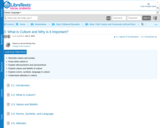
Textbook chapter used in CSI EDUC 204 Families, Communities, and Culture.
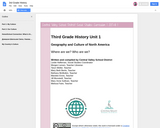
The unit is focused on the examination of geography in terms of “place.” Students dive into inquiry to answer the compelling questions, “Where are we?” and “Who are we?” Through these two questions students will understand where they live and where people around the world live. Students will also dive into the term “culture” and define it through many characteristics. Students will examine and reflect upon their own culture and research different cultures of North America.

In this class, we will explore America's diversity through questions of immigration, race, gender/sexuality and class--some of the major ways our culture is organized. It is comprised of 9 lessons based on online resources, plus 2 auto-ethnography assignments. This class was originally taught by Huma Mohibullah at Renton Technical College.

Religion is a significant aspect of human cultures everywhere. In these lessons, we explore questions such as: What are the main elements of religion? Why is believing in a higher power important to human beings across cultures? How is religion related to our social orders? How is religion related to the politics of today's world?This resource is comprised of 7 lessons based on online modules, plus a final presentation assignment. Each lesson includes a discussion or written assignment. This class was originally taught by Huma Mohibullah at Renton Technical College.

This course provides the opportunity to discuss, orally and in writing, cultural, ethical, and social issues on a stylistically sophisticated level. It explores representative and influential works from the nineteenth century to the present, through literary texts (prose, drama, poetry), radio plays, art, film, and architecture, as well as investigates topics such as the human and the machine, science and ethics, representation of memory, and issues of good and evil. Taught in German.

En este curso el estudiante perfeccionará su comunicación oral y escrita mediante el estudio y la discusión de temas relacionados al impacto social y cultural de la ciencia y la tecnología en ciertas sociedades hispanas. Algunos de los temas a tratar son los efectos de los cambios tecnológicos en la estructura familiar y comunitaria, en las relaciones entre los sexos, en la identidad personal y cultural, en el mundo natural y en los sistemas de valores, la religión, la educación y el trabajo. También se examinan y discuten diversas actitudes hacia la innovación tecnológica y científica así como las ramificaciones éticas de las decisiones tecnológicas.

This interdisciplinary course surveys modern European culture to disclose the alignment of literature, opposition, and revolution. Reaching back to the foundational representations of anarchism in nineteenth-century Europe (Kleist, Conrad) the curriculum extends through the literary and media representations of militant organizations in the 1970s and 80s (Italy’s Red Brigade, Germany’s Red Army Faction, and the Real Irish Republican Army). In the middle of the term students will have the opportunity to hear a lecture by Margarethe von Trotta, one of the most important filmmakers who has worked on terrorism. The course concludes with a critical examination of the ways that certain segments of European popular media have returned to the “radical chic” that many perceive to have exhausted itself more than two decades ago.

Sometime after 1492, the concept of the New World or America came into being, and this concept appeared differently - as an experience or an idea - for different people and in different places. This semester, we will read three groups of texts: first, participant accounts of contact between native Americans and French or English speaking Europeans, both in North America and in the Caribbean and Brazil; second, transformations of these documents into literary works by contemporaries; third, modern texts which take these earlier materials as a point of departure for rethinking the experience and aftermath of contact. The reading will allow us to compare perspectives across time and space, across the cultural geographies of religion, nation and ethnicity, and finally across a range of genres - reports, captivity narratives, essays, novels, poetry, drama, and film. Some of the earlier authors we will read are Michel Montaigne, William Shakespeare, Jean de Léry, Daniel Defoe and Mary Rowlandson; more recent authors include Derek Walcott, and J. M. Coetzee.

Al-Bab is a portal website designed to introduce non-Arabs to Arab culture by providing links to news sources, country profiles, articles, and a blog on Middle East current events. There are also specific links related to learning Arabic: dictionaries, language classes, textbooks, and other information pertaining to the study of Arabic. A free e-book, The Birth of Modern Yemen, is available for download.
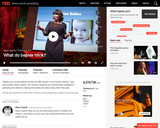
"Babies and young children are like the R&D division of the human species," says psychologist Alison Gopnik. Her research explores the sophisticated intelligence-gathering and decision-making that babies are really doing when they play.

American Encounters provides a narrative of the history of American art that focuses on historical encounters among diverse cultures, upon broad structural transformations such as the rise of the middle classes and the emergence of consumer and mass culture, and on the fluid conversations between "high" art and vernacular expressions. The text emphasizes the intersections among cultures and populations, as well as the exchanges, borrowings, and appropriations that have enriched and vitalized our collective cultural heritage.

The Maryland State Department of Education is working to prevent the misuse and abuse of opioids. This is a student-centered lesson for the 9-12 grade band. This lesson can be modified or remixed to meet the needs of the students you teach. The content of this lesson includes students identifying and analyzing influences that could lead to drug use. Students are then tasked with forming strategies to overcome factors and influences that could lead to drug use.

This is a collection of mini lectures created by anthropologists and those in conversation with anthropology as supplimental material to assist college and university instructors who were made to shift their courses online because of COVID19.For more information, see here.To contribute, please create an OER author account and send your name and OER registered email to AnthropologyTeaching@gmail.com.
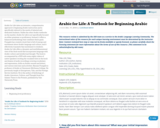
Arabic for Life takes an intensive, comprehensive approach to beginning Arabic instruction and is specifically tailored to the needs of talented and dedicated students. Unlike the other Arabic textbooks on the market, Arabic for Life is not specifically focused on either grammar or proficiency. Instead, it offers a balanced methodology that combines these goals. Frangieh has created a book that is full of energy and excitement about Arabic language and culture, and it effectively transmits that excitement to students. Arabic for Life offers a dynamic and multidimensional view of the Arab world that incorporates language with Arabic culture and intellectual thought.
The book is accompanied by a DVD with some eighty videos of native speakers reciting the vocalized texts in the book and dozens of audio recordings covering vocabulary and expressions, drills on Arabic sounds and letters, and various exercises and activities.
Bassam Frangieh is professor of Arabic at Claremont-McKenna College. He previously taught at Georgetown, Yale, and the Foreign Service Institute. He is the author of Anthology of Arabic Literature, Culture, and Thought from Pre-Islamic Times to the Present, published by Yale University Press.
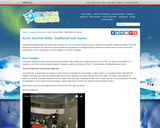
This article describes several traditional Inuit games and provides background information and resources for incorporating them into a lesson or unit on Inuit culture.
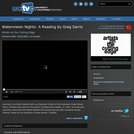
Serving in his fourth elected term as Chairman (Chief) of the Federated Coast Miwok Tribe, novelist Greg Sarris is the author of Watermelon Nights. In 1996, he wrote and executive produced with Robert Redford the award-winning HBO miniseries Grand Avenue, based on his collection of short stories. (23 minutes)

Este é um E-book contendo diálogos de dois personagens num passeio pelo rio Sergipe em Aracaju/SE, de Tototó. Nesse passeio os dois personagens dialogam sobre o que percebem do ambiente no percurso, como os efluentes que são despejados no rio bem como, a beleza da paisagem. O passeio se inicia no terminal dos Tototós e finaliza no Largo da Gente Sergipana e nesse local os personagens conversam sobre a importância cultural do monumento e fazem algumas observações no que concerne às questões socioambientais.
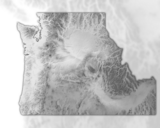
This 2018 edition is the first to be released in a digital, fully-interactive format, designed to highlight facets of the Pacific Northwest landscape with novel approaches to data presentation. Where previous editions of the atlas were designed to ask and answer questions, this atlas serves as a platform for the geographically curious to explore the region, providing as many critical questions as it does critical answers.
Beyond this page are maps of the familiar and the unfamiliar. Migration maps highlight human movement between the Pacific Northwest and the rest of the United States; a wildfire timeline chronicles the year-to-year spread of modern and historical fires; and the watershed guide abandons traditional political boundaries in favor of natural, hydrological borders. All data in the atlas were gathered from publically accessible sources, compiled using open-source software and coding libraries. This is an atlas designed to be open, responsive, and to satisfy the geographic curiosity of any and all interested.
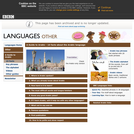
This site from the BBC hosts a brief primer on the Arabic language. It discusses such topics as where the language is spoke, where it came from, and tips on etiquette. The guide also includes interesting examples of the Arabic language, such as tongue twisters, jokes, and famous quotations.